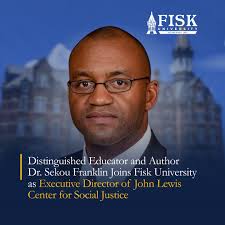NASHVILLE, Tenn. — Fisk University is pleased to welcome Dr. Sekou Franklin – an acclaimed scholar, community advocate and author – as the new Executive Director of the John Lewis Center for Social Justice.
Named after late Congressman and Fisk alumnus, the John Lewis Center was established in 2019 with the mission to advance social justice, a vision to which Lewis devoted his life’s work and a pillar of Fisk’s legacy.
“Dr. Franklin brings a wealth of knowledge and expertise in scholarly activism, policy and civil rights to Fisk” says Dr. Agenia W. Clark, President of Fisk University. “He has demonstrated a deep commitment to social justice, education and community – values deeply ingrained in Fisk’s mission and legacy. We are overjoyed for Dr. Franklin to lead the John Lewis Center.”
Prior to joining Fisk, Dr. Franklin served as a political science professor at Middle Tennessee State University for more than 20 years. He’s also taught at Williams College, University of Illinois and currently serves as an adjunct professor at Belmont University’s College of Law. Heavily devoted to scholarship and activism, Dr. Franklin has served as President of the National Conference of Black Political Scientists, completed research for voting rights litigation across the American south, authored several books focused on civil rights and activism, and worked closely alongside numerous civil rights organizations.
“It is a true honor and privilege to join Fisk University as the Executive Director of the John Lewis Center,” says Dr. Sekou Franklin. “Fisk University stands among the nation’s most storied institutions, distinguished by its deeply profound social justice legacy – from Alumni like W.E.B DuBois to John Lewis – and its enduring and invaluable contributions to American history. I am proud to carry both Fisk’s and John Lewis’ legacies forward through my work at the center.”
As the Executive Director, Dr. Franklin will advance policy-impact research, develop student leaders, enhance campus-wide social justice initiatives and promote campus-community partnerships with advocacy and civil rights organizations.


